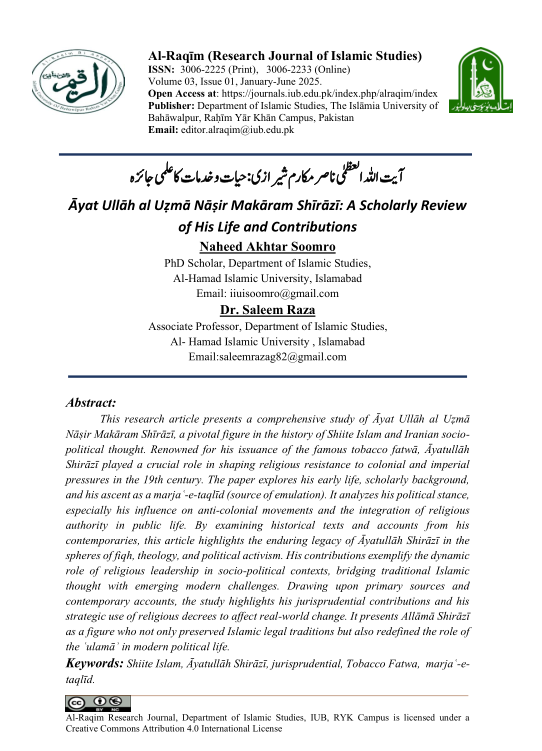آیت اللہ العظمیٰ ناصر مکارم شیرازی: حیات و خدمات کا علمی جائزہ
Āyat Ullāh al Uẓmā Nāṣir Makāram Shīrāzī: A Scholarly Review of His Life and Contributions
Keywords:
Shiite Islam, Āyatullāh Shirāzī, jurisprudential, Tobacco Fatwa, marjaʿ-e-taqlīd.Abstract
This research article presents a comprehensive study of Āyat Ullāh al Uẓmā Nāṣir Makāram Shīrāzī, a pivotal figure in the history of Shiite Islam and Iranian socio-political thought. Renowned for his issuance of the famous tobacco fatwā, Āyatullāh Shirāzī played a crucial role in shaping religious resistance to colonial and imperial pressures in the 19th century. The paper explores his early life, scholarly background, and his ascent as a marjaʿ-e-taqlīd (source of emulation). It analyzes his political stance, especially his influence on anti-colonial movements and the integration of religious authority in public life. By examining historical texts and accounts from his contemporaries, this article highlights the enduring legacy of Āyatullāh Shirāzī in the spheres of fiqh, theology, and political activism. His contributions exemplify the dynamic role of religious leadership in socio-political contexts, bridging traditional Islamic thought with emerging modern challenges. Drawing upon primary sources and contemporary accounts, the study highlights his jurisprudential contributions and his strategic use of religious decrees to affect real-world change. It presents Allāmā Shirāzī as a figure who not only preserved Islamic legal traditions but also redefined the role of the ʿulamāʾ in modern political life.

Downloads
Published
Issue
Section
License
Copyright (c) 2025 Naheed Akhtar Soomro, Dr. Saleem Raza

This work is licensed under a Creative Commons Attribution-NonCommercial 4.0 International License.




